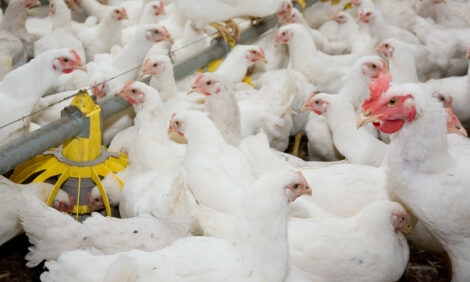



Pilgrim's Problems Pass on to Producers
ARKANSAS, US - Broiler growers are also suffering form the demise of Pilgrim's Pride.Some Arkansas contract chicken farmers find themselves squeezed between the needs of a poultry company fighting for survival and the demands of personal creditors, reports NWAnews.
Texas-based Pilgrim's Pride Corporation filed for Chapter 11 bankruptcy in December in an effort to reorganize its debts and emerge as a profitable company.
The affected poultry farmers are hopeful that attempts by the governors of Louisiana and Arkansas to find buyers for two plants scheduled to close in May will pan out, but some say their situation is grim.
Poultry, a big industry in Arkansas, is hurting from high fuel and feed costs and low prices brought on by an oversupply of chicken. The state ranks second in US poultry production with more than 1.17 billion broilers raised in 2007, according to the National Chicken Council's web site. Only Georgia produced more in 2007 – at 1.4 billion.
James Thompson Jr. of Hare, Wynn, Newell & Newton of Birmingham, Alabama, an attorney experienced in representing farmers in contract disputes, said farmers can have all their worldly goods tied up in a contract that leaves them out of the payment line when the company files for bankruptcy.
"Farmers are considered unsecured creditors in these Chapter 11 bankruptcies," Mr Thompson said. Chapter 11 of the US Bankruptcy Code allows a company to reorganize its debts.
The nearly 80-year-old contract grower system is such a good deal for poultry companies that there is no motivation to change it, he added.
Poultry companies say rising costs make it harder to turn a profit and keep chicken prices under control.
Growing losses
Lloyd Phelps has been expanding his farm in the Strong community of Union County in south-east Arkansas since 1973, when he started with four acres. He has kept the farm going by working other jobs, mainly in the oil refining industry, he said. The 335 acres he has now are primarily in timber, and he raises cattle.
The six chicken houses on the farm, located 15 miles west of El Dorado, are the result of steady work for three companies since 1978, Mr Phelps told NWAnews.
"I've grown for ConAgra, Country Pride and now Pilgrim's Pride," he explained.
As the information chairman for the Union County Farm Bureau, Mr Phelps attended – and spoke at – a whirlwind series of meetings that followed Pilgrim's Pride's statement on 27 February that it would close the processing plants in El Dorado and Farmerville, Louisiana.
If he is lucky, his voice will be all he will lose after the plants close in May, he said.
The Farmerville plant is about 25 miles south-east of El Dorado and is considered part of the local community, El Dorado Mayor Mike Dumas said.
The El Dorado plant lost about 600 jobs in July. Another 100 positions were cut in September. The city has a population of just under 20,000.
The closing will put about 800 people out of work at the El Dorado plant and 1,300 at the Farmerville plant.
The plant closings will save Pilgrim's Pride about $110 million a year. Costs associated with the closings are estimated at $35 million.
Ray Atkinson, a Pilgrim's Pride spokesman, said that the company understands the dire effect closing the plants will have on employees and growers, and he wishes the step was not necessary.
"However, we are taking these decisive steps now in order to protect more than 40,000 employees and 5,000 growers of Pilgrim's Pride as we work to restructure our business and ultimately emerge from Chapter 11 as a stronger and more efficient company," Mr Atkinson explained.
The plant closings will also reduce the supply of chicken going to market by up to 10 per cent, Pilgrim's Pride said in a February news release.
Downside of vertical integration
"I'm blessed that my loan is paid down enough. If this would have happened four years ago, I would have lost the farm," Mr Phelps told NWAnews. "There is a high percentage of people around here who will lose everything they have."
He is one of 290 contract poultry growers in the region who raise chickens for Pilgrim's Pride under a system that the industry calls vertical integration.
In vertical integration, a poultry company supplies chicks, feed and medicine to farmers who provide the buildings, utilities and labor to raise those chicks to market weight. Farmers earn profit on the birds' weight gain, usually so many cents per pound.
Mr Phelps said recruiters from Pilgrim's Pride came to Union County predicting the best possible profit margins for farmers willing to sign contracts. And, for a few years, the returns matched the predictions.
His houses would be filled with 130,000 chicks he has nursed into six-pound broilers. He could turn over six flocks each year, he said.
Frank Jones, director of the Center for Poultry Excellence in the department of poultry science, University of Arkansas at Fayetteville, said farmers like Mr Phelps have become the designated providers for a population that is unwilling or unable to raise its own food.
"Consumers want high quality food products at low prices," Dr Jones said. Finding the balance between what consumers are willing to pay someone else to grow their food and covering the costs incurred while growing it is a constant struggle, he said.
No poultry company wants to close a processing plant, he said.
"They'd love to keep producing birds but, in a capitalist system, you have to make a profit to stay in business," Jones said.
Every poultry house in the area represents a loan note at a local bank, Mayor Dumas said in February. Many times, a farmer's land, equipment and home are pledged against the loan.
Mr Phelps says it can cost more than $200,000 to build a modern chicken house to company standards.
Yearly loan payments can add up to more than $100,000 a year, depending on the number of houses on a farm. He said he needs to make $60,000 to make his payments this year.
Mr Phelps left his other job a couple of years ago to work his farm. "I'll have to get another job now. That was going to be my retirement. There are not very many jobs in this area that pay that much," he said.
Fair deal sought
The NWAnews report continues that former Pilgrim's Pride contractors in Conway, Van Buren, Pope and Perry counties filed suit against the company in September, claiming it committed fraud when it closed its Clinton processing plant in August and discontinued contracts.
Pilgrim's Pride stopped production and cut 360 jobs at the Clinton processing plant and the feed mill in Atkins, north-west of Conway on Interstate 40.
The farmers hired attorney Mr Thompson to file the lawsuit. The lawyer also represents 85 hog farmers in Arkansas and Oklahoma who were left in the lurch when Tyson Foods Inc. cancelled their contracts in 2002. Tyson eventually agreed to settle the case for $42.5 million.
The lawsuit by 74 farmers against Pilgrim's Pride claims that the company's recruiters promised growers that they would have chickens for as long as they wanted to raise them, and that the Clinton plant was in operation to stay.
Thompson said contract farming and sharecropping are very similar.
"But contract farmers have a great autonomy that the sharecropper didn't. They still have the land," Thompson said. "They are land-poor and equipment-poor. A little wrinkle like one bad season and the farmer is upside down forever."
Mr Phelps added that in many cases, contract farmers cannot even rely on the security of owning the property if there is a loan against it.
"A sharecropper knew he wasn't on his own property to begin with. We kind of thought we owned our property, at least until the bank says otherwise," Mr Phelps said.








